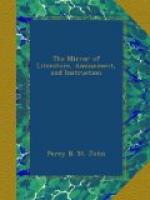“Sacrilegious villains!” cried he, “give up your impious purpose, and resign the body of the recreant lost one. Let it rot in its earthy prison, till the last trumpet rouse it in resurged life to burn in eternal fire.”
A deep and silent plunge of the Moriscoe’s poignard struck the blaspheming bigot in the throat; another blow pierced his heart, as he fell into the imperfectly hollowed grave; and while he lay there, several strokes were dealt on him by the feeble hands of the old man with one of the spades, which he tremblingly seized. And then, in the instinct of terror at the deed, he shovelled the loose earth over the bleeding carcass, while the Moriscoe’s pale profile looked stern and rigid in the expiring light. The work was soon complete; and the mound of earth thus hastily thrown up (soon covered with as rank weeds as ever sprang from a polluted soil) were long marked by shuddering superstition as “the grave of the Mahommedan girl.” The fate of the inquisitor was quite unsuspected; and he might have been still believed to have disappeared supernaturally, or perished by some less awful visitation, had not unerring records thrown light on his fate.
The tottering steps of the old man quickly led the way across the thickly planted site of the little Sablon, and by many a winding lane and alley towards the hill of Caudenburgh, till the Moriscoe, with his beloved burthen, found a safe refuge in the old man’s dwelling, in the narrow street on the side of the hill, not a hundred yards below the house of the Marquess of Assembourg.
* * * * *
SPIRIT OF THE PUBLIC JOURNALS.
MUSICAL LITERATURE IN NORTH AMERICA.
We have just received two numbers of a New York periodical, entitled the “Euterpeiad, a Musical Review and Tablet of the Fine Arts,” published every fortnight, or, as our transatlantic fellow-labourers express it, “semi-monthly,” and feel flattered at finding our opinions quoted, our columns referred to with acknowledgment, and, still more, our custom of giving good and cheap music, followed, though on a smaller scale, by this critic of the new world. One of the two numbers before us contains Paisiello’s delightful serenade from the Barber of Seville, as arranged by Bishop for two voices; and the other, a movement from Rossini’s overture to William Tell; both very creditable, as well to the selector’s taste as to the progress of American musical typography. The “Euterpeiad” is not confined to music, but embraces the whole circle of the fine arts, theatrical criticism, and even original tales. We are concerned, however, only with the musical part, and, as a specimen of the manner in which it is probable that department will be conducted, give the following extract from the editor’s address:




